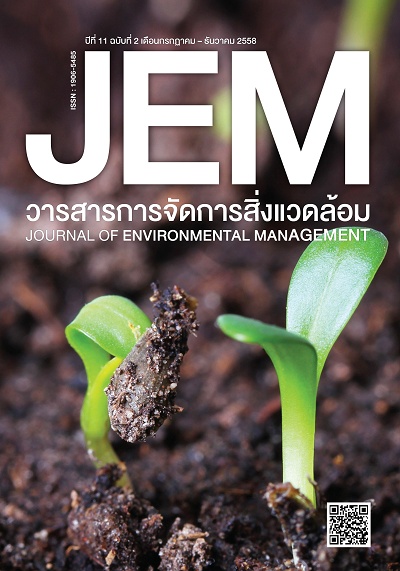นักสิ่งแวดล้อมที่รู้คิด: สิ่งประดิษฐ์สร้างทางการปกครองเพื่อการรักษาสิ่งแวดล้อมที่ยั่งยืน
DOI:
https://doi.org/10.14456/jem.2015.9บทคัดย่อ
การวิจัยนี้ มีวัตถุประสงค์เพื่อศึกษากระบวนการสร้างนักสิ่งแวดล้อมจากแนวคิดชีวะการเมือง บนพื้นฐานของการบริหารจัดการชีวิตด้วยวิธีการของเทคโนโลยีแห่งตัวตน เพื่อสร้างความเป็นนักสิ่งแวดล้อมที่ถูกผลิตจากภาคปฏิบัติการอันเป็นเหตุการณ์ในกระบวนการจัดการสิ่งแวดล้อม ตามแนวทางของอรุณ อกราวอล อันได้แก่ การจัดสรรทรัพยากรที่เป็นธรรม การสร้างกลไกการติดตามตรวจสอบ จากการสอดส่องดูแลและการควบคุมความสงบเรียบร้อย โดยมีการกำกับตนเองไปตามกฎเกณฑ์ที่วางไว้ร่วมกันและการมีบทลงโทษที่สามารถบังคับใช้ได้จริง ซึ่งทำให้เกิดตัวตนของนักสิ่งแวดล้อม ด้วยแนวทางการศึกษาเรื่องเล่า ด้านการจัดการสิ่งแวดล้อมของชาวบ้านที่เป็นคณะกรรมการป่าชุมชนบ้านกลาง อำเภอแม่เมาะ จังหวัดลำปาง จากการสร้างบทสนทนา เพื่อนำมาวิเคราะห์ให้เห็นประเด็นหลักของเรื่องราวต่างๆ ผลการวิจัยพบว่า วิกฤติการณ์ของชุมชนได้สร้างความเป็นผู้นำด้านสิ่งแวดล้อมขึ้นมา เช่นเดียวกับตัวตนของผู้พิทักษ์ป่าที่เกิดขึ้นจากการสอดส่องดูแลผืนป่า ขณะที่ความเป็นนักสิ่งแวดล้อมของชาวบ้านเกิดขึ้นจากการดำรงชีพตามวิถีของชุมชน
เอกสารอ้างอิง
Kanchanapan, A. (2013). Thinking Michel Foucault, Critical Thinking. From Discourse of the Subject to a Turning Point of the Self. [In Thai: คิดอย่างมิเชล ฟูโกต์ คิดอย่างวิพากษ์ จากวาทกรรมของอัตบุคคลถึงจุดเปลี่ยนของอัตตา]. Chiang Mai: Chiang Mai University Press.
Agrawal, A. (2005). Environmentality: Technologies of Government and the Making of Subjects. Durham: Duke University Press.
Bold, C. (2012). Using Narrative in Research. London: SAGE Publications.
Danaher, G., Schirato, T., & Webb, J. (2000). Understanding Foucault. London: SAGE Publications.
Foucault, M. (1983). The Subject and Power. In H. L. Dreyfus & P. Rabinow (Eds.), Michel Foucault: Beyond Structuralism and Hermeneutics (pp. 208 – 226). Chicago: The University of Chicago Press.
Foucault, M. (2004). Technology of the self. In A. Blaikie, M. Hepworthy, M. Holmes, A. Howson, D. Inglis & S. Sartain (Eds.), The Body: Critical Concepts in Sociology, Vol. 1 (pp. 108 – 130). London and New York: Routledge.
Lemke, T. (2011). Beyond Foucault: From Biopolitics to the Government of Life. In U. Bröckling, S. Krasmann & T. Lemke (Eds.), Governmentality: Current Issues and Future Challenges (pp. 165 – 184). New York: Routledge.
Luke, T. W. (1995). Sustainable Development as a Power/Knowledge System: the Problem of “Governmentality”. In F. Fisher & M. Black (Eds.), Greening Environmental Policy: the Politics of a Sustainable Future (pp. 21 – 23). New York: St. Martin’s Press.
McNay, L. (1992). Foucault and Feminism: Power, Gender and the Self. Cambridge: Polity Press.
Patterson, W. (2013). Narratives of Events: Labovian Narrative Analysis and Its Limitations. In M. Andrews, C. Squire & M. Tamboukou (Eds.), Doing Narrative Research (pp. 27 – 46). London: SAGE Publications.
Phoenix, A. (2013). Analysing Narrative Contexts. In M. Andrews, C. Squire & M. Tamboukou (Eds.), Doing Narrative Research (pp. 72 – 87). London: SAGE Publications.
Rutherford, S. (2007). Green Governmentality: Insights and Opportunities in the Study of Nature’s Rule. Progress in Human Geography, 31(3), 291 - 307.
Skinner, D. E. (2007). Organising Organic: A Foucauldian Analysis of the Regulation of Organic Food Production. PhD Thesis, Warwick University.
Squire, C. (2013). From Experience-Centred to Socioculturally-Oriented Approaches to Narrative. In M. Andrews, C. Squire & M. Tamboukou (Eds.), Doing Narrative Research (pp. 47 – 71). London: SAGE Publications.
Tamboukou, M. (2013). A Foucauldian Approach to Narratives. In M. Andrews, C. Squire & M. Tamboukou (Eds.), Doing Narrative Research (pp. 88 – 107). Los Angeles: SAGE Publications.



